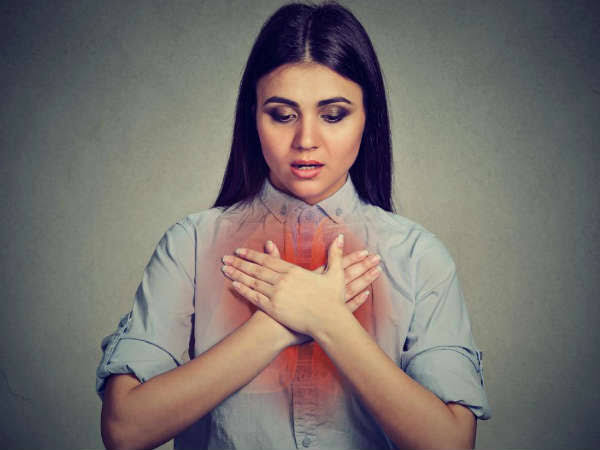Disorders Cure
oi-Neha Ghosh
on June 3, 2020
You most often have a hiccup when you eat food too quickly or drink too much carbonated beverages, isn’t it? And you try various ways to get rid of it. Well, hiccups are common and almost everyone has experienced it at some point in their lives. The medical term for hiccup is singultus, which is derived from the Latin word ‘singult’ which means to catch one’s breath while sobbing [1].
Hiccup is a sudden, involuntary contraction of the diaphragm(a dome-shaped muscle used during breathing is located just below the heart and lungs) and intercostal muscles (a group of muscles situated in between the ribs of the chest wall that assist with the breathing process) [1]. Each contraction is followed by a sudden closure of the vocal cords, which produces the ‘hic’ sound during a hiccup.
Hiccups can occur in children, infants, adults and even in a foetus still in the womb. It usually lasts for few minutes and goes away within 48 hours.
 From Sunflower Oil To Coconut Oil, Which Cooking Oils Are Good For Your Health
From Sunflower Oil To Coconut Oil, Which Cooking Oils Are Good For Your Health
Types And Causes Of Hiccups [1]
• Acute hiccups – They are often of short duration, lasting for less than 48 hours. The most common causes of acute hiccups are gastroesophageal reflux disease (GERD) and associated hiatal hernia. Acute hiccups are linked to eating heavy meals, irritation caused by spicy foods, drinking carbonated beverages or alcohol. It is estimated that 10 per cent of GERD patients have acute hiccups.
• Persistent hiccups – They last for more than two days. One in four patients with oesophageal tumours tends to have persistent hiccups.
• Intractable hiccups – They last for a month or longer.
Persistent and intractable hiccups have been associated with a number of medical conditions, which include the following:
• Cardiovascular disorders such as atrial pacing, aortic aneurysm (thoracic or abdominal), catheter ablation of atrial fibrillation, myocardial infarction, pericarditis and temporal arteritis.
• Disorders of the central nervous system (CNS), which include encephalitis, meningitis, multiple sclerosis, neuromyelitis optica, neoplasms, Parkinson disease, seizure, stroke, aneurysms (especially posterior inferior cerebellar artery), lateral medullary syndrome, syringomyelia and vascular malformations.
• ENT disorders like cough, goiter, laryngitis, neck cyst, neoplasms, pharyngitis, and recent intubation.
• Infections caused by helicobacter pylori, herpes simplex, herpes zoster, influenza, malaria, neurosyphilis and tuberculosis.
• Gastrointestinal disorders such as aerophagia, bowel obstruction, gastric distention, oesophageal cancer, oesophagitis, gallbladder disease, gastric distention, hepatitis, neoplasms, pancreatitis, peptic ulcer disease, and stomach volvulus.
• Metabolic disorders like hypocapnia, hypocalcemia, hypokalemia, hyponatremia, diabetes mellitus, and uremia.
• Psychological reactions including excitement, stress, distress and hyperventilation.
• Asthma, bronchitis, pneumonia, diaphragmatic tumour or a hernia, empyema, lymphadenopathy, mediastinitis, neoplasms, pleuriti and pulmonary embolus.
• Surgeries such as bronchoscopy, gastrointestinal endoscopy and tracheostomy.
• Medications such as alpha-methyldopa, aripiprazole, chemotherapy drugs, azithromycin, morphine, benzodiazepines, ethanol, donepezil and dexamethasone, to name a few.

Risk Factors Of Hiccups
• Older males with increased height and weight are susceptible to intractable hiccups [1], [2]
• Patients with central nervous system disorders and GERD are at a risk of getting persistent hiccups [1].
• Consumption of excess alcohol
• Dehydration
• Stress, excitement and anxiety.

Complications Of Hiccups
Severe and continuous hiccup can lead to dehydration, weight loss, exhaustion, fatigue, malnutrition, insomnia, despair, depression and even death in extreme cases [3].
 Can You Feed A Baby When He Has Hiccups?
Can You Feed A Baby When He Has Hiccups?

When To See A Doctor
In most cases, hiccups resolve on their own, however, consult a doctor if hiccups last for more than three hours, if they disturb your eating or sleeping habits or if they are accompanied with fever, shortness of breath and vomiting.

Diagnosis Of Hiccups
The diagnosis of prolonged hiccups is usually done based on the symptoms you are experiencing. The doctor will physically examine you and ask about your symptoms. After which, additional laboratory and imaging tests (CT scan MRI scan, chest X-ray, fluoroscopy of the diaphragm, ECG and gastroscopy) may be performed to determine the underlying cause of hiccup [4].
READ RELATED: Hidden Dangers of Vitamins, Say Experts

Treatment Of Hiccups
Acute hiccups
• Holding your breath and breathing into a paper bag can stop the frequency of hiccups.
• Supra-supramaximal inspiration is a technique that may stop hiccups. First, exhale completely, then inhale and hold the breath for ten seconds, then inhale twice again without exhaling, each time holding the breath for five seconds [5].
• Other techniques to stop acute hiccups are pulling on the tongue [6], putting pressure on the eyeballs, sipping vinegar, swallowing sugar, gargling, drinking ice water, and Valsalva maneuver.
Persistent and intractable hiccups
• Chlorpromazine is a well-known drug approved by the U.S. Food and Drug Administration (FDA) to treat persistent hiccups [7].
• If hiccups are associated with GERD, antacids, antihistamines or proton pump inhibitor may help treat this kind of hiccups [8].
• Medications such as metoclopramide and GABA agonists like baclofen and gabapentin can treat persistent and intractable hiccups.
Metoclopramide can bring relief from hiccups in cancer, stroke and brain tumour patients. Baclofen reduces excitement and aids in muscle relaxation. It also has been shown to be effective in treating intractable hiccups in stroke patients. Gabapentin has been shown to treat severe chronic hiccups in cancer patients [9].
• Other medications used for the treatment of persistent hiccups are amantadine, antipsychotic drugs, nimodipine, amitriptyline, atropine, benzonatate, midazolam and valproic acid [10].

Prevention Of Hiccups
One can’t prevent hiccups, but the susceptibility of hiccups can be lowered by following these tips:
• Don’t overeat
• Avoid eating hot or spicy foods
• Don’t drink excess alcohol or carbonated beverages.
• Try to keep yourself calm
• Don’t eat too quickly
• Keep yourself protected from sudden temperature changes.
Common FAQs
Q. Are hiccups dangerous?
A. Hiccups aren’t dangerous and are rarely a sign of a health problem. However, if hiccups continue for more than 48 hours, consult a doctor.
Q. How long should hiccups last?
A. Hiccups should last for few minutes and not last longer than two days.
Q. Why won’t my hiccups go away?
A. If hiccups last for more than 48 hours, it could be a sign of an underlying medical condition.
Q. Why am I hiccupping so much?
A. It may be due to eating food too quickly.Eating excess spicy foods or swallowing air along with foods
Q. Is it normal to get hiccups multiple times a day?
A. If you are having multiple hiccup episodes that are occurring frequently throughout the day, it could be a sign of a serious medical condition. In this case, consult a doctor immediately.
GET THE BEST BOLDSKY STORIES!
Allow Notifications
You have already subscribed
Source: boldsky blog






















